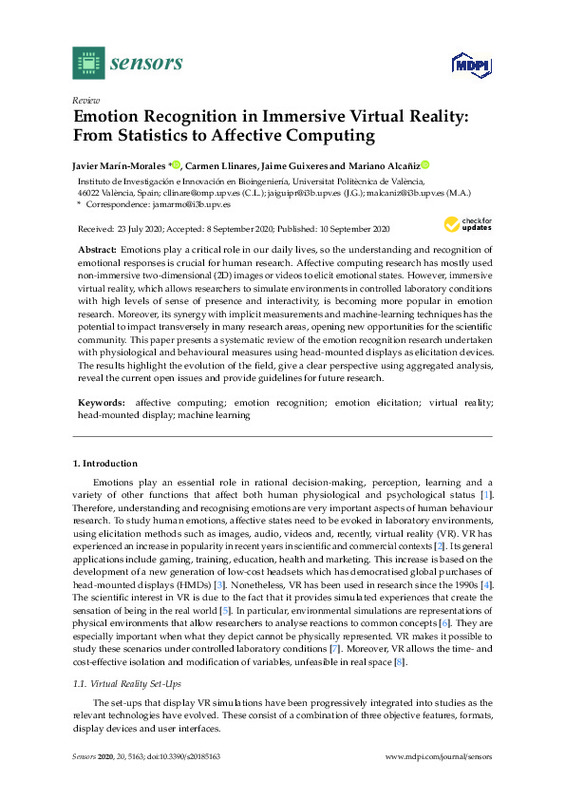JavaScript is disabled for your browser. Some features of this site may not work without it.
Buscar en RiuNet
Listar
Mi cuenta
Estadísticas
Ayuda RiuNet
Admin. UPV
Emotion Recognition in Immersive Virtual Reality: From Statistics to Affective Computing
Mostrar el registro sencillo del ítem
Ficheros en el ítem
| dc.contributor.author | Marín-Morales, Javier
|
es_ES |
| dc.contributor.author | Llinares Millán, María Del Carmen
|
es_ES |
| dc.contributor.author | Guixeres Provinciale, Jaime
|
es_ES |
| dc.contributor.author | Alcañiz Raya, Mariano Luis
|
es_ES |
| dc.date.accessioned | 2021-11-05T14:10:03Z | |
| dc.date.available | 2021-11-05T14:10:03Z | |
| dc.date.issued | 2020-09 | es_ES |
| dc.identifier.uri | http://hdl.handle.net/10251/176398 | |
| dc.description.abstract | [EN] Emotions play a critical role in our daily lives, so the understanding and recognition of emotional responses is crucial for human research. Affective computing research has mostly used non-immersive two-dimensional (2D) images or videos to elicit emotional states. However, immersive virtual reality, which allows researchers to simulate environments in controlled laboratory conditions with high levels of sense of presence and interactivity, is becoming more popular in emotion research. Moreover, its synergy with implicit measurements and machine-learning techniques has the potential to impact transversely in many research areas, opening new opportunities for the scientific community. This paper presents a systematic review of the emotion recognition research undertaken with physiological and behavioural measures using head-mounted displays as elicitation devices. The results highlight the evolution of the field, give a clear perspective using aggregated analysis, reveal the current open issues and provide guidelines for future research. | es_ES |
| dc.description.sponsorship | This research was funded by European Commission, grant number H2020-825585 HELIOS. | es_ES |
| dc.language | Inglés | es_ES |
| dc.publisher | MDPI AG | es_ES |
| dc.relation.ispartof | Sensors | es_ES |
| dc.rights | Reconocimiento (by) | es_ES |
| dc.subject | Affective computing | es_ES |
| dc.subject | Emotion recognition | es_ES |
| dc.subject | Emotion elicitation | es_ES |
| dc.subject | Virtual reality | es_ES |
| dc.subject | Head-mounted display | es_ES |
| dc.subject | Machine learning | es_ES |
| dc.subject.classification | EXPRESION GRAFICA EN LA INGENIERIA | es_ES |
| dc.subject.classification | ESTADISTICA E INVESTIGACION OPERATIVA | es_ES |
| dc.subject.classification | ORGANIZACION DE EMPRESAS | es_ES |
| dc.title | Emotion Recognition in Immersive Virtual Reality: From Statistics to Affective Computing | es_ES |
| dc.type | Artículo | es_ES |
| dc.identifier.doi | 10.3390/s20185163 | es_ES |
| dc.relation.projectID | info:eu-repo/grantAgreement/EC/H2020/825585/EU/HELIOS: A Context-aware Distributed Social Networking Framework/ | es_ES |
| dc.rights.accessRights | Abierto | es_ES |
| dc.contributor.affiliation | Universitat Politècnica de València. Departamento de Ingeniería Gráfica - Departament d'Enginyeria Gràfica | es_ES |
| dc.contributor.affiliation | Universitat Politècnica de València. Departamento de Organización de Empresas - Departament d'Organització d'Empreses | es_ES |
| dc.description.bibliographicCitation | Marín-Morales, J.; Llinares Millán, MDC.; Guixeres Provinciale, J.; Alcañiz Raya, ML. (2020). Emotion Recognition in Immersive Virtual Reality: From Statistics to Affective Computing. Sensors. 20(18):1-26. https://doi.org/10.3390/s20185163 | es_ES |
| dc.description.accrualMethod | S | es_ES |
| dc.relation.publisherversion | https://doi.org/10.3390/s20185163 | es_ES |
| dc.description.upvformatpinicio | 1 | es_ES |
| dc.description.upvformatpfin | 26 | es_ES |
| dc.type.version | info:eu-repo/semantics/publishedVersion | es_ES |
| dc.description.volume | 20 | es_ES |
| dc.description.issue | 18 | es_ES |
| dc.identifier.eissn | 1424-8220 | es_ES |
| dc.identifier.pmid | 32927722 | es_ES |
| dc.identifier.pmcid | PMC7570837 | es_ES |
| dc.relation.pasarela | S\417767 | es_ES |
| dc.contributor.funder | COMISION DE LAS COMUNIDADES EUROPEA | es_ES |








